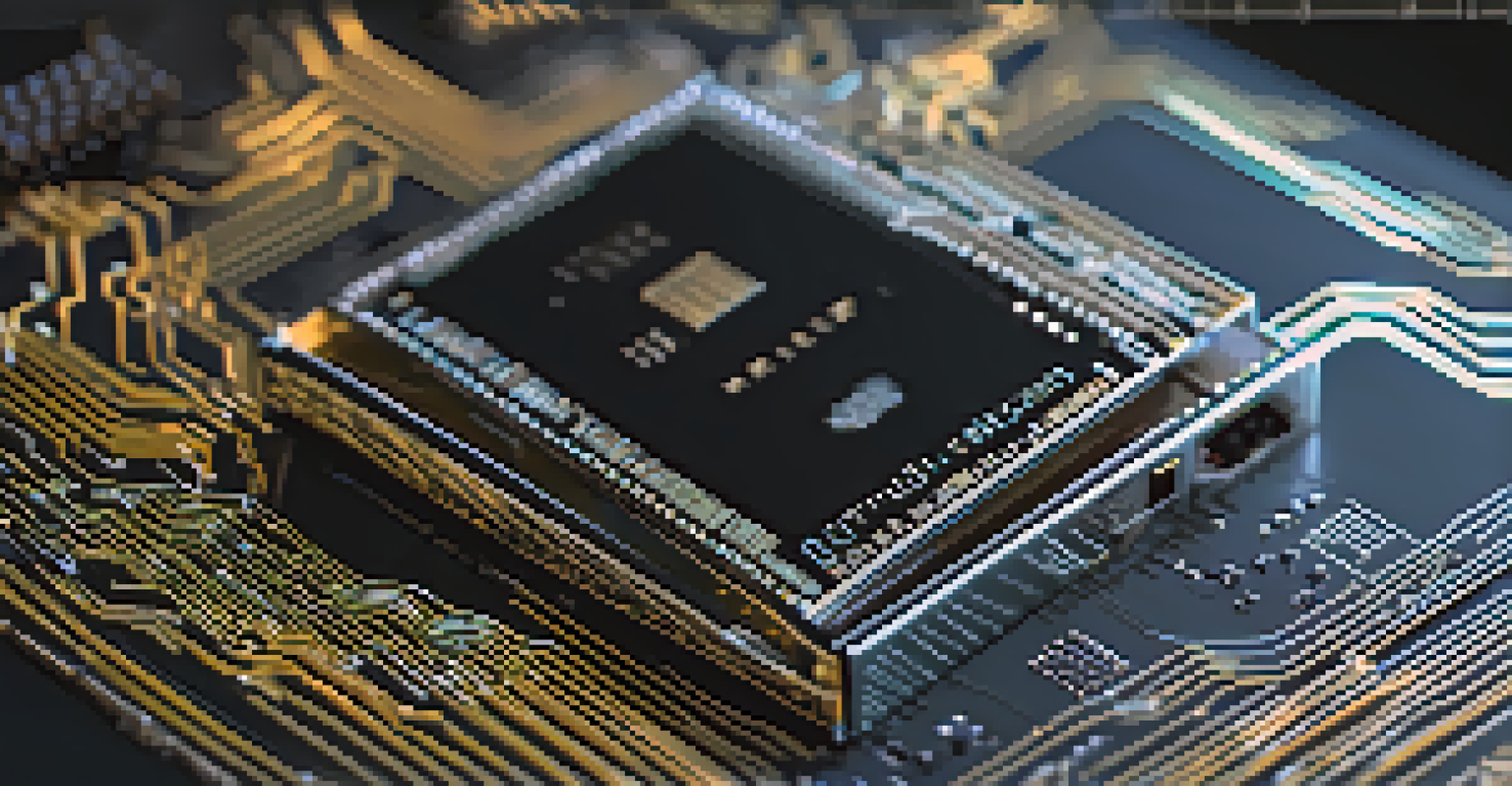Security Concerns: Bitcoin's Integration in DeFi Systems

Understanding Bitcoin and DeFi: A Brief Overview
Bitcoin, often hailed as the pioneer of cryptocurrencies, operates on a decentralized network that allows for peer-to-peer transactions without intermediaries. Decentralized Finance (DeFi) represents a shift in the financial landscape, enabling users to engage in financial activities such as lending, borrowing, and trading without traditional banks. Integrating Bitcoin into DeFi systems can provide liquidity and broaden access to financial services, but it also introduces a host of security concerns.
Bitcoin is a technological tour de force.
The essence of DeFi lies in smart contracts—self-executing contracts with the terms directly written into code. While these contracts can streamline processes and reduce costs, they are not immune to vulnerabilities. Any flaws in the code can lead to exploits, making it crucial to prioritize security when incorporating Bitcoin into these platforms.
Moreover, the volatility of Bitcoin prices adds another layer of complexity to its use in DeFi. Users must be aware that fluctuations can significantly impact their investments, which can lead to sudden losses in collateral or liquidity pools. Understanding these dynamics is essential for anyone looking to navigate the DeFi space safely.
Common Security Risks in DeFi Systems
DeFi systems are often targeted by hackers due to their open-source nature and high-value transactions. One of the most common security risks is the impermanent loss, which occurs when providing liquidity to a pool and the value of the assets changes unfavorably. This can lead to substantial losses for users who might not fully understand the implications of their liquidity provision.

Another significant concern is smart contract vulnerabilities, which can be exploited if not properly audited. For instance, the infamous DAO hack in 2016 serves as a stark reminder of how a flaw in the contract can result in millions being siphoned off. Therefore, rigorous testing and auditing of code before deployment are critical steps to mitigate these risks.
Security Risks in DeFi Systems
DeFi platforms face significant security threats, including impermanent loss, smart contract vulnerabilities, and phishing attacks, making user education crucial.
Phishing attacks are yet another threat that users face in the DeFi ecosystem. As the popularity of DeFi grows, so does the sophistication of these attacks. Users must remain vigilant and educate themselves on how to protect their assets, such as verifying website URLs and using hardware wallets for added security.
The Role of Decentralization in Security
One of the core principles of DeFi is decentralization, which can enhance security by eliminating single points of failure. In a decentralized system, control is distributed among numerous nodes, making it harder for attackers to compromise the entire network. This contrasts with traditional financial systems that often rely on centralized entities, which can be more vulnerable to hacks.
The future of finance is decentralized, and we are just getting started.
However, decentralization also comes with its challenges. The lack of a central authority means that users must take full responsibility for their assets and security practices. This shift in responsibility can be daunting for those who are new to the world of cryptocurrencies and DeFi.
Moreover, while decentralization can reduce certain risks, it doesn’t eliminate them. Users must still be aware of potential vulnerabilities in the protocols they use, as decentralized systems can also suffer from governance attacks and other security issues. Hence, understanding the balance between decentralization and security is vital for users.
Understanding Smart Contracts and Their Vulnerabilities
Smart contracts are a double-edged sword in the world of DeFi. They automate processes, reducing the need for intermediaries, but they are only as secure as the code they are built upon. A poorly written smart contract can lead to unexpected behaviors, including loss of funds, which is why developers must prioritize security in their design.
To illustrate, consider a smart contract that governs a lending protocol. If there’s a bug in the code that miscalculates interest rates, it could lead to either overcharging borrowers or undercompensating lenders. Such issues can erode trust in the platform and deter users from participating.
Decentralization Enhances Security
While decentralization reduces single points of failure, it shifts the responsibility for asset security onto users, necessitating a clear understanding of potential risks.
Thus, rigorous testing, peer reviews, and audits are essential steps in the development of smart contracts. Developers must adopt best practices to ensure that their contracts are secure before they go live, protecting users from potential exploits and fostering a safer DeFi environment.
Best Practices for Securing Bitcoin in DeFi
To navigate the complexities of DeFi safely, users can implement several best practices to secure their Bitcoin holdings. First and foremost, using reputable platforms with a solid track record of security is crucial. Researching the history of a DeFi protocol and its developers can provide insights into its reliability.
Additionally, employing hardware wallets can drastically reduce the risk of online hacks. Hardware wallets store private keys offline, making them less susceptible to phishing attacks or malware. This extra layer of security is a simple yet effective way to protect your assets.
Lastly, staying informed about the latest security trends and vulnerabilities in the DeFi space is vital. The landscape is constantly evolving, and being proactive about security measures can prevent potential losses, ensuring a safer experience in the world of decentralized finance.
Challenges in Regulatory Compliance for DeFi
As DeFi continues to grow, so does the scrutiny from regulatory bodies. The decentralized nature of these systems makes it challenging to establish clear regulatory frameworks. Without proper regulation, users may find themselves exposed to higher risks, as there may be no recourse in the event of a hack or loss of funds.
Moreover, regulations can vary significantly from one jurisdiction to another, creating a confusing landscape for developers and users alike. For example, a DeFi platform that operates legally in one country may face legal challenges in another, which can complicate its operations and user experience.
Future Innovations in DeFi Security
The integration of Bitcoin into DeFi is expected to drive advancements in security measures, like multi-signature wallets and decentralized insurance protocols, enhancing user protection.
This uncertainty can deter potential investors who are wary of the risks associated with unregulated platforms. Therefore, finding a balance between fostering innovation and ensuring user protection is essential for the long-term sustainability of the DeFi ecosystem.
The Future of Bitcoin in DeFi: Security Innovations
Looking ahead, the integration of Bitcoin into DeFi systems is likely to drive innovation in security solutions. Developers are increasingly focusing on creating more robust protocols that prioritize user safety without compromising the benefits of decentralization. This could lead to the development of advanced security measures, such as multi-signature wallets and enhanced auditing tools.
Furthermore, the rise of decentralized insurance protocols can provide users with an added layer of protection. These protocols can help users recover funds in the event of a hack or loss, making DeFi more appealing to a broader audience. As these solutions become more mainstream, they may significantly enhance the overall security of DeFi ecosystems.

Ultimately, the future of Bitcoin in DeFi will depend on the community's ability to adapt and innovate. By addressing existing security concerns and implementing new technologies, users can enjoy the benefits of DeFi with greater peace of mind, paving the way for a safer and more inclusive financial future.